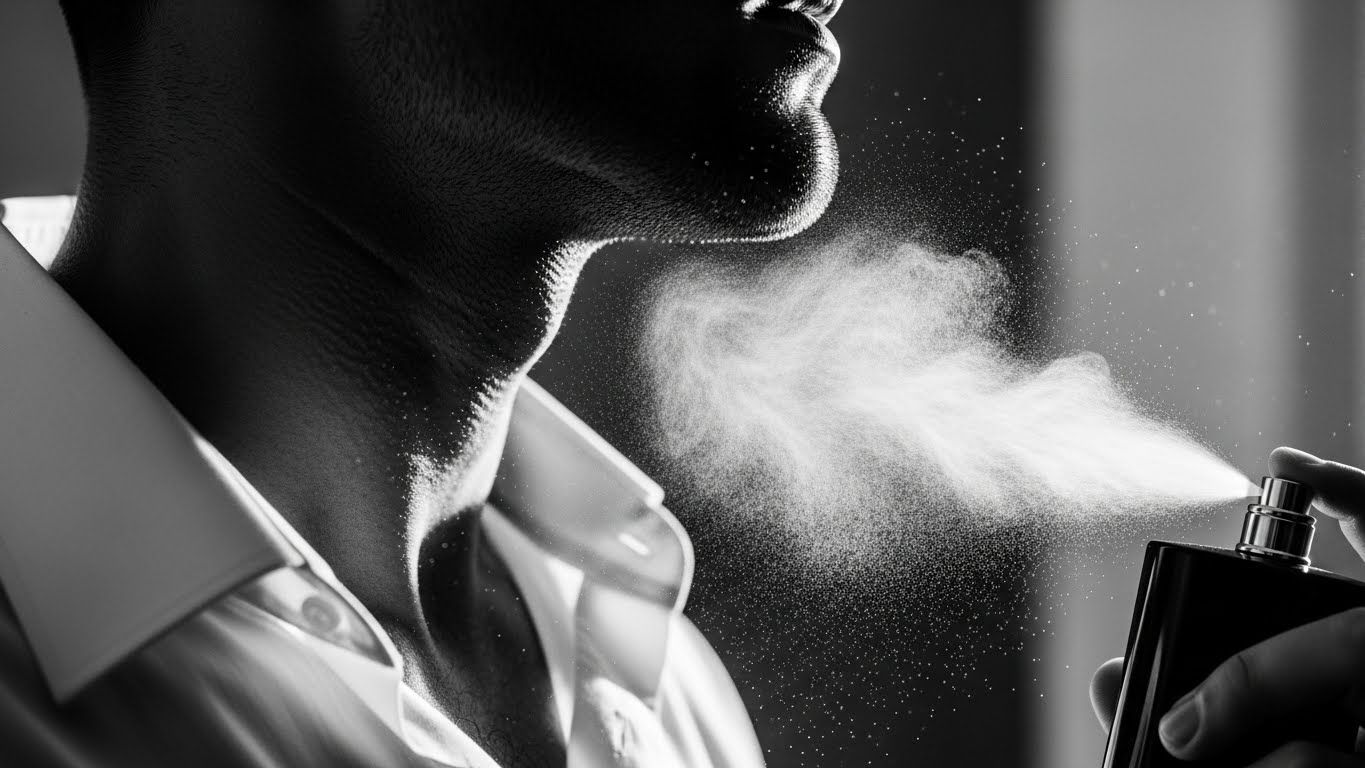

How To Apply Cologne
The art of applying cologne lies in moderation. A fragrance, like conversation, should invite rather than impose, leaving behind a trace that lingers only in memory.
- Words: Rupert Taylor
There are few things more misunderstood in modern grooming than cologne. It should be the subtlest of art forms, a whisper, a hint, a suggestion that somewhere in your vicinity a well-dressed man might exist. Instead, too many treat it as a military exercise, deploying entire regiments of musk at dawn.
One steps onto the Tube and is immediately assaulted by clouds of citrus despair, amber aggression, and something that might once have been sandalwood. Gentlemen, we must do better.
To apply cologne correctly is not simply to smell pleasant. It is to communicate taste, restraint, and the ability to read a room without fogging it. The goal is not to arrive before your scent does, nor to linger long after your body has departed. The goal, in short, is elegance: invisible but unmistakable.
So let us proceed, with both dignity and deodorant, to the essential art of wearing fragrance like a statesman rather than a teenage lifeguard.
Step One | Choose Like a Minister, Not a Mascot
Before we speak of application, we must first speak of selection. You cannot apply taste if you have not purchased it.
A proper cologne, or eau de parfum if you are feeling continental, is chosen not for its marketing but for its manner. Does it enter a room quietly and make friends, or does it burst in like a man named Brad with a Bluetooth speaker?
If the bottle looks like it was designed for a nightclub VIP area, proceed with caution. True fragrance should look as though it might be owned by a duke, or at least a duke’s discreet nephew. Think Dior Homme, Creed Aventus, Maison Francis Kurkdjian Baccarat Rouge 540, or Tom Ford Oud Wood.
And remember, gentlemen, your scent should never shout your intentions. If your cologne announces, “I’m wearing cologne,” you have already lost.
Step Two | Preparation, The Cleansing of the Realm
Before applying fragrance, one must begin with a clean canvas. Applying cologne to unwashed skin is like painting frescoes on a wet dog.
Shower. Properly. Use soap. Dry yourself as if you’ve been summoned to an audience with the Foreign Secretary. Then, and only then, is your body fit to receive the blessing of scent.
Never apply cologne immediately after a hot shower, when your pores are as open as a gossip columnist. Wait a few minutes; have a sip of coffee; contemplate your legacy. Then proceed.
A dab of unscented moisturiser on the pulse points, wrists, neck, chest, will also help anchor your fragrance for the day. It’s like setting primer before a diplomatic summit.
Step Three | The Pulse Points, A Map of Discretion
Now we arrive at the most perilous part of the process: application. The where and how much that separate the sophisticated from the scandalous.
There are only four acceptable pulse points for fragrance: wrists, neck, collarbone, and should you be feeling particularly French, the back of the neck. These are areas where heat emanates gently, diffusing the scent naturally.
Anything beyond this and you are entering “perfumed fog machine” territory. Under no circumstances should you spray your ankles, your hair, or, heaven forbid, your trousers. Cologne is not Febreze.
One to two sprays on each pulse point will suffice. That is it. Two sprays if it’s an eau de parfum, three if it’s an eau de toilette, and if it’s an aftershave, you’re probably already wearing too much polyester to be reading this.
The key principle is restraint. Cologne is a conversation, not a campaign.
Step Four | Never Rub, You’re Not Polishing Silver
There is an old, disastrous habit among men of spraying cologne on the wrists and then rubbing them together as if starting a campfire. This, dear reader, must cease immediately.
Friction breaks down the molecular structure of the fragrance, distorting its composition and robbing it of subtlety. It’s like shaking a bottle of Château Margaux before pouring.
Spray, let it settle, and allow the scent to unfold naturally. Perfume is meant to breathe, not be bullied.
A gentleman applies cologne as he would deliver good news, lightly, confidently, and without making a scene.
Step Five | The Test of Distance
If you can smell yourself constantly, you’ve failed. The proper test of a well-applied fragrance is that you should catch it only occasionally, a faint echo when you move, a ghostly reminder that you exist.
Your scent is for others to notice, not for you to inhabit like a tent. If someone leans in during conversation and murmurs, “You smell extraordinary,” you have succeeded. If they recoil slightly and say, “Good heavens,” you have not.
Fragrance should make people curious, not concerned.
Step Six | Know Thy Audience
The scent you wear to a board meeting should not be the same one you wear to dinner, unless you are being fired and seduced in the same evening.
For daytime, lighter notes, citrus, green, aquatic, convey freshness and optimism, even if you possess neither. Think Acqua di Parma Colonia, Hermès Terre d’Hermès, or Chanel Bleu.
For evening, deeper, darker fragrances with amber, oud, and leather signal intrigue and confidence. Tom Ford Noir de Noir or YSL Tuxedo work beautifully.
One does not turn up to breakfast smelling of cedar and desire. Timing is everything.
Step Seven | Reapplication, The Subtle Encore
Should you wish to refresh your scent mid-day, do so privately. There is no sight more tragic than a man misting himself in public like a crop duster over Provence.
A discreet spritz on the chest or collarbone in a restroom (ideally one with marble surfaces and flattering lighting) will suffice. Never reapply directly before entering a lift. You’ll asphyxiate your companions and your reputation simultaneously.
Remember: fragrance intensifies with heat. By the evening, your morning’s restraint will have matured into quiet confidence. Trust it.
Step Eight | Layering, for the Ambitious
For the truly advanced, layering scents can produce something uniquely yours. But this is not an amateur sport.
Stick to fragrances within the same family, woods with spices, citruses with florals. Think of it as arranging a dinner party where everyone gets along. Pairing conflicting notes (say, vanilla and vetiver) is like seating a vegan next to a taxidermist.
If you get it right, you’ll smell like the main character in a French film. If you get it wrong, you’ll smell like the inside of a scented candle shop in meltdown.
Step Nine | Beware the Sillage Snare
Sillage, for those unfamiliar with French or fragrance blogs, is the term for the scented trail one leaves behind. The amateurs aim for big sillage. The masters aim for good sillage.
Yours should be a passing impression, a trace that lingers gently in the air like a compliment. If someone can follow your scent for more than three feet, you’ve veered into “airport duty-free” territory.
The most elegant fragrances are the ones people notice only after you’ve left the room, and remember long after they’ve forgotten what you were saying.
Step Ten | The Philosophy of Fragrance
To apply cologne well is to understand that it’s not merely about smelling pleasant. It’s about suggesting that you possess a life beyond the visible, that somewhere, deep within, there’s poetry.
Your cologne should feel like an afterthought of sophistication. It should say, I travel, I read, I once knew someone named Allegra.
Scent, after all, is memory. The right fragrance can conjure summers in Italy, winters in Mayfair, or the faint whiff of regret after a midnight proposal. It is the most human of luxuries, ephemeral, intimate, entirely unnecessary, and utterly essential.
Final Notes on How to Apply Cologne
In the end, gentlemen, applying cologne is not chemistry. It is choreography, a dance between restraint and expression.
You are not trying to impress the room; you are trying to charm the air. Think of fragrance as punctuation, not prose, the full stop to your ensemble, the quiet wink that says, I’ve considered the details.
So spray with care. Apply with confidence. Walk through your cloud like a monarch returning from exile.
And when someone stops you and says, “You smell extraordinary,” smile modestly and murmur, “Just a touch of something.”
Because that, that effortless suggestion, is what separates the merely scented from the truly remembered.


